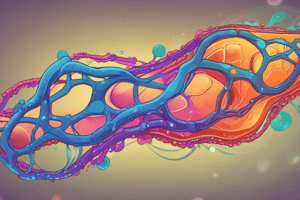Podcast
Questions and Answers
What is one of the main functions of the DNA within eukaryotic cells?
What is one of the main functions of the DNA within eukaryotic cells?
- Protein degradation
- DNA replication (correct)
- Cellular respiration
- Lipid synthesis
Which structural feature is characteristic of the eukaryotic nucleus?
Which structural feature is characteristic of the eukaryotic nucleus?
- Lack of membranes
- Single membrane structure
- Multiple nucleoli
- Double membrane structure (correct)
What is the purpose of the nuclear membrane in eukaryotic cells?
What is the purpose of the nuclear membrane in eukaryotic cells?
- Facilitates photosynthesis
- Increases cellular metabolism
- Stores excess nutrients
- Separates nuclear content from cytoplasm (correct)
In eukaryotic cells, what process occurs primarily within the nucleus?
In eukaryotic cells, what process occurs primarily within the nucleus?
Which of the following statements about the nuclear structure of eukaryotic cells is incorrect?
Which of the following statements about the nuclear structure of eukaryotic cells is incorrect?
What is the primary role of the perinuclear space?
What is the primary role of the perinuclear space?
Which proteins are essential for the structural makeup of the nuclear pore complex?
Which proteins are essential for the structural makeup of the nuclear pore complex?
What must a protein possess to gain entry into the nucleus?
What must a protein possess to gain entry into the nucleus?
What is the structure of the nuclear pore complex predominantly characterized by?
What is the structure of the nuclear pore complex predominantly characterized by?
What type of transport do porins in the outer membrane facilitate?
What type of transport do porins in the outer membrane facilitate?
Which of the following components is NOT part of the nuclear pore complex?
Which of the following components is NOT part of the nuclear pore complex?
What primarily occurs in the outer membrane of the nucleus?
What primarily occurs in the outer membrane of the nucleus?
Which charged amino acid is specifically mentioned as part of the Nuclear Localization Signal?
Which charged amino acid is specifically mentioned as part of the Nuclear Localization Signal?
What role does the central channel of the nuclear pore complex play?
What role does the central channel of the nuclear pore complex play?
Which statement accurately describes the main function of the nuclear pore complex?
Which statement accurately describes the main function of the nuclear pore complex?
Flashcards
Nuclear Envelope
Nuclear Envelope
The double-layered membrane that surrounds the nucleus of a eukaryotic cell.
DNA Replication
DNA Replication
The process of creating a copy of DNA.
Transcription
Transcription
The process of creating RNA from DNA.
RNA Modification
RNA Modification
Signup and view all the flashcards
Nucleus
Nucleus
Signup and view all the flashcards
Perinuclear Space
Perinuclear Space
Signup and view all the flashcards
Nuclear Envelope Pores
Nuclear Envelope Pores
Signup and view all the flashcards
Nuclear Localization Signal (NLS)
Nuclear Localization Signal (NLS)
Signup and view all the flashcards
Amino Acids in NLS
Amino Acids in NLS
Signup and view all the flashcards
Nucleoporins
Nucleoporins
Signup and view all the flashcards
Nuclear Pore Structure
Nuclear Pore Structure
Signup and view all the flashcards
Outer Membrane Porins
Outer Membrane Porins
Signup and view all the flashcards
Outer Nuclear Membrane
Outer Nuclear Membrane
Signup and view all the flashcards
Mitochondrial Energy Production
Mitochondrial Energy Production
Signup and view all the flashcards
Oxidative Metabolism
Oxidative Metabolism
Signup and view all the flashcards
Study Notes
Mitochondria
- Outer Membrane: Contains porins for passive transport (<10kDa), TOM complex (protein import), and enzymes for lipid metabolism and apoptosis.
- Inner Membrane: Rich in cardiolipin, houses respiratory chain complexes, ATP synthase, and transport proteins (e.g., TIM), forms cristae increasing surface area.
- Matrix: Contains mtDNA, RNA, ribosomes, and enzymes for pyruvate oxidation, fatty acid oxidation, and the citric acid cycle.
- Intermembrane Space: Contains H+ ions, cytochrome C, and enzymes. A narrow space for transient molecule passage.
- Oxidative Metabolism: Three stages: Citric Acid Cycle, Electron Transport Chain, and Oxidative Phosphorylation.
- Oxidative Phosphorylation: ATP synthesis using a proton gradient.
- Mitochondrial DNA (mtDNA): Circular, multiple copies (4-5 nucleoids) with 16,569 base pairs. Inherited maternally.
- Mitochondrial Biogenesis: Process where cells increase mitochondrial number to meet energy needs.
- Protein and Lipid Import: Proteins targeted to TOM complex by presequences, directed to TIM complex, and assisted by chaperones in the matrix. Phospholipids acquired from the ER.
- Mitochondrial Division: Divides by fission. Defective mitochondria are removed by autophagy.
Nucleus
- Structure: Double membrane (inner and outer membrane) separating nuclear content from the cytoplasm.
- Perinuclear Space: Located between the inner and outer membranes.
- Nuclear Envelope: The double-membrane structure.
- Nuclear Matrix: Insoluble materials supporting nuclear organization and includes the nuclear lamina.
- Nuclear Pores: Channels for communication between nucleoplasm and cytoplasm. Composed of nucleoporins arranged in octagonal symmetry.
- Nuclear Localization Signal (NLS): Necessary for proteins to enter the nucleus, containing charged amino acids like lysine.
- Nuclear Export Signal (NES): Necessary for protein export from the nucleus, often hydrophobic sequences.
- Nuclear Lamina: Protein framework inside the nucleus.
- Laminopathies: Genetic disorders from mutations in lamina proteins, affecting the envelope's structure.
Nucleus (Continued)
- Chromosomal Territories: Each chromosome occupies a specific territory in the nucleus, minimizing intermixing.
- Gene Activity: Genes near the surface of territories are actively transcribed.
- Karyopherins (Importins/Exportins): Proteins responsible for transporting molecules across the nuclear envelope.
- Ran Protein: Regulates directionality of transport in the nucleus.
- Ran-GTP: Ran bound to GTP.
- Ran-GDP: Ran bound to GDP.
- Ran-GEF: Located inside the nucleus and converts Ran-GDP to Ran-GTP.
- Ran-GAP: Located in the cytoplasm and converts Ran-GTP to Ran-GDP.
- RNA Transport: mRNA transport does not require Ran-GTP gradient, while transport of other RNA types (tRNA, rRNA, snRNA, miRNA) does. Exportins/Importins and Ran gradient facilitate this transport.
Studying That Suits You
Use AI to generate personalized quizzes and flashcards to suit your learning preferences.


